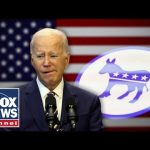The diplomatic chess match in the Middle East is heating up, and all eyes are on former President Trump and his team. Recently, Deputy Special Envoy to the Middle East, Morgan, shed some light on the ongoing negotiations involving Iran and their nuclear ambitions. The crux of the matter is this: Trump has made it crystal clear that under no circumstances should Iran be allowed to develop nuclear weapons. This stance shapes the overarching narrative of strength and diplomacy that many supporters associate with his administration.
Morgan reiterated that during Trump’s first term, he immediately took steps to put pressure on the Iranian regime. By signing a national security memorandum early in his presidency, he kicked off a “maximum pressure campaign” to deter Iran from pursuing nuclear weapons. Recently, new sanctions were introduced against entities that finance Hezbollah. This strong-arm tactics approach hasn’t just been for show—it’s meant to send a direct message to Tehran that any negotiations must lead to meaningful denuclearization.
The vision for Iran isn’t just about preventing a nuclear crisis; it’s about envisioning a brighter future for the Iranian people. Trump and his team want to show that the path to prosperity and stability is available, but it cannot include a toxic nuclear arsenal. Morgan highlighted stark contrasts between cities like Riyadh and Abu Dhabi, bustling with new developments, versus Tehran, which suffers from decay and economic woes. The message is clear: a more prosperous Iran is possible if only Tehran’s leaders will engage with the international community earnestly.
There’s no doubt that the stakes are high, not just for Iran but for the entire Middle East landscape. The prospects of peace and cooperation are on the table, with many leaders from countries like Saudi Arabia and the UAE expressing cautious optimism about Trump’s approach. The notion of a non-adversarial relationship is tantalizing, suggesting new economic opportunities and collaborations that could reshape the region for the better. But will the Iranian leadership seize this chance?
Additionally, as the global situation remains fluid, the implications of the Ukraine conflict can’t be ignored. Morgan pointed out Trump’s long-standing commitment to peace, emphasizing that under his leadership, many of these conflicts may never have escalated to the levels seen today. The complexities of international relations are vast, with vested interests colliding at every turn, but Trump’s administration previously found a way to navigate through these challenges effectively.
In summary, it is a pivotal moment for U.S. foreign policy—one that seeks to balance strength with the hope for peace. If Trump’s vision for a unified and prosperous Middle East takes root, it could very well earn him accolades like a Nobel Peace Prize. For now, the world watches, waiting to see if Tehran will take Trump up on his offer for dialogue and a better future, or if the status quo will continue to hinder progress.




